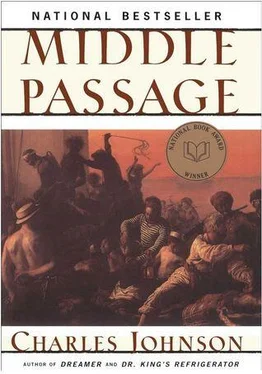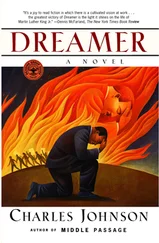“. . If not you’d better go
It’s a nation of a queer place; day and night
a show!
Clergymen, priests, friars, nuns, women of all
stains;
Negroes in purple and fine linen, and slaves in
rags and chains.
Ships, arks, steamboats, robbers, pirates,
alligators,
Assassins, gamblers, drunkards, and cotton speculators;
Sailors, soldiers, pretty girls, and ugly
fortunetellers;
Pimps, imps, shrimps, and all sorts of dirty
fellows;
White men with black wives, et vice versa too,
A progeny of all colors — an infernal motley
crew!. .”
Only the hours I spent hunched over the skipper’s logbook kept me steady. Along with his sea chest, it had been salvaged after the shipwreck, and once its pages dried I returned to recording all I could remember, first as a means to free myself from the voices in my head, to pour onto these water-stained pages as much of the pain as I could until at the end of each evening, after writing furiously and without direction, I at last felt emptied and ready for sleep. Then, as our days aboard the Juno wore on, I came to it with a different, stranger compulsion — a need to transcribe and thereby transfigure all we had experienced, and somehow through all this I found a way to make my peace with the recent past by turning it into Word. Consequently, when I wrote I was incapable of venturing forth into the social world, so Baleka did this for me, begging passengers for things I needed, such as a wig.
Because I’d lost most of my hair, you see. Where once I had had a thick, bushy helmet that only a dogbrush could unkink, I was now almost as bald as Martin Van Buren, though a damned sight less tubby: a kind of old kid I seemed in the cabin’s mirror as I squeezed on a raven-black headpiece, one tight at the temples like a stocking cap. My beard was Biblical in length, my joints Job-like in their creaking. Each morning when I rose, my ribs felt like iron rods. Our travels through several time zones had played badly with the metabolic cycles of my body, according to the ship’s surgeon, causing a loss of nitrogen and sulfur, and confusing my inner ear. And, given the diseases I’d lived through, I feared I was probably sterile. No matter what I did — hairstyling, mud facials, or fancy perfumes — I could not hide what I was: a wreck of the Republic . The girl, as dear to me now as a daughter, brought fresh clothes for me, a cane I needed badly, plus a set of wooden teeth so I could smile without looking like the Grand Canyon or the Kali Gorge.
“Ruth’ford,” she said two Saturdays after our rescue, “you can’t stay in this room writing forever! Please go out with me — we don’t have to walk far, or stay out very long.”
“Tomorrow maybe.”
“But you should thank the rich gentleman who gave us these things, shouldn’t you?”
She had a point there. Among the women on board, Captain Quackenbush found the loveliest linen for Baleka, round-toed shoes fastened with bright ribbons, and a turbanlike bonnet very French in design. “I suppose you’re right. Did he tell you his name?”
“Uh-huh.” She nodded. “Mr. Zeringue.”
Suddenly I could not breathe. I fumbled with the cabin window until it flew open, and hung out my head. Old fears flooded back, particularly when my gaze fell again on the girl, because if she had not misspoken herself, and if the wig I wore — burning my scalp — belonged to Papa, then Baleka and the other children were legally his property, pure and simple, which was a thought I could not abide. But was it he? Had Providence hurled me to Africa, then pulled me from the Drink, only to place me — and these innocents — again at his mercy? “Baleka”—I threw on my jacket—“you’re sure he said Zeringue? What did he look like?”
She puffed her cheeks, poked out her belly, and, with her right hand, flicked ashes from an invisible cigar. There could be no mistaking the model for this pantomime.
“And tell me, child, where is he now?”
“There’s a big room on the ship. He was going there.”
“Can you show me the way?”
It was now Baleka who skiffled me along the well-scrubbed deck, but I soon slowed, weaving from the bite of cold wind. Every few feet I listed to port, supported only by my cane and the girl who, after such excruciating progress, at last brought me to anchor at a huge messroom abaft the mainmast. From just left of the door, I heard someone at a piano, practicing a wedding march. In the room’s quiet, planked interior, embellished for some festive occasion, the noise on deck did not intrude. Toward the rear, Captain Quackenbush stood on a makeshift platform with a Bible, consulting in whispers with — yes, by crimus, below him was Papa, looking, if you can believe this, profoundly sad, beat down around the ankles like a man loaded with chains. He seemed to me poorer in both pocketbook and spirit, and doubtless shaken by his devastating losses when the Republic went down right before his eyes. His face was pasty, his posture a little stooped, and about him was the air of a man confused by his barrister, his lover, or both. He was involved in some kind of rehearsal. Wedding flowers were everywhere. Yet I sensed something else, an internal signal that once warned me shifting winds bore watching, and — as Papa’s fiancée walked toward him in a blue silk dress, beneath a Kitty Fisher bonnet — it was blasting away. Her legs were wobbly from motion sickness; Papa and the captain seemed worried she might bring up her last meal on the lush carpet leading to the altar. She did not fully turn, but in my bones I knew this was Isadora. But an Isadora I could not believe. In the messroom’s hushed light, which created soft overtones on her lips and a warm cast to her skin, her beauty was heart-stabbing. Added to that, she had lost about fifty pounds. (Soon I would know why.) I started to speak, but could not; I wanted to enter, but my will began to wither. For an instant I must have gone blank, the room blurring and turning soft at the edges like the effect of four fingers of whiskey. Rubbing my face with both hands, my cane in the crook of my arm, I looked again, saw her step shyly beside Papa, and then I could stand it no longer. I was about to barge inside and separate them when a hand fell heavily upon my shoulder.
“Suh,” said Santos, “this is a private function.” He was as muscular and lumpy-looking as ever, dressed in a neckstock cravat and barrow-coat: the very portrait of misery. Modern styles in fashion clearly were not the best attire for a giant afflicted with that rare disease — gaposis — where nothing fits right. Pulling at his collar, he tilted his head left, studying me. Recognition flickered and burst into flame. “Say, hold on heah! Just one fuhcockin minute! By Gawd, you’s a pitiful sight, but underneath that wig, ain’t you that thief from Illinois?”
Our commotion was attracting onlookers.
“Papa, looka what just pulled into harbor!” Santos reached with his right hand, planning to grab my left wrist, a move I’d seen McGaffin make during the mutiny, and something (I cannot say what) swept over me (I cannot say how), but I sidestepped as I’d seen Atufal do, snatched his wrist and allowed Santos’s propulsion to pitch him forward whilst I took a half step closer inside his guard, dropped quickly to the ground directly below him, then scissored his waist with my legs and tipped him over backward, the back of his skull bouncing off the deck. I’d wager the deck was more damaged than Santos’s head. Like the brontosaurus, snapping at something that bit it yesterday, it might be a full thirty minutes before the pain of that bump traveled from his skin to his central nervous system. Nevertheless, this elegant and unexpected eruption of capoeira, which now seemed as natural to me as lifting my arm, was enough to sting his pride and send him scurrying backward, startled, into a forest of legs. We were surrounded by spectators, among them Squibb, who had come running from our room when he discovered I was gone.
Читать дальше












